Related Research Articles
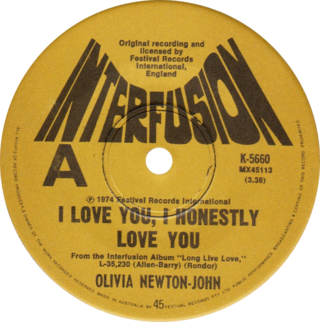
"I Honestly Love You" is a song recorded by Olivia Newton-John and released in 1974 on the album Long Live Love in the United Kingdom and If You Love Me, Let Me Know in the United States. The song became a worldwide pop hit, her first number-one single in the United States and Canada. The single was first released in Australia as "I Love You, I Honestly Love You", as per its chorus. The song was written by Jeff Barry and Australian singer and composer Peter Allen. The latter recorded it around the same time for his album Continental American.

"Drift Away" is a song by Mentor Williams, written in 1970 and originally recorded by British singer Mike Berry on his 1972 album Drift Away. A version by John Henry Kurtz was released two months later in November 1972. Mentor Williams was a country songwriter, and John Henry Kurtz was an actor and swamp rock singer. It was later given to soul singer Dobie Gray for whom it became a surprise international hit. In 1973, the song became Gray's biggest hit, peaking at number five on the US Billboard Hot 100 and receiving a gold certification from the Recording Industry Association of America (RIAA). The song has been covered by numerous musicians.
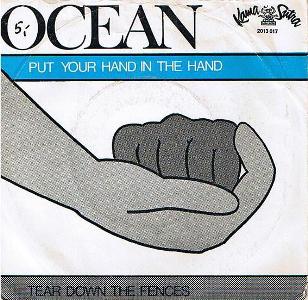
"Put Your Hand in the Hand" is a gospel pop song composed by Gene MacLellan and first recorded by Canadian singer Anne Murray from her third studio album Honey, Wheat and Laughter.

"Break It to Me Gently" is a pop song written by blues musician Joe Seneca with lyrics by Diane Lampert. Both Brenda Lee and Juice Newton were met with considerable success with their versions of the song.
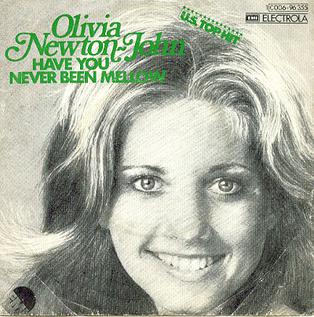
"Have You Never Been Mellow" is a song recorded by British-Australian singer Olivia Newton-John for her 1975 fifth studio album of the same name. Written and produced by John Farrar, the song was released as the lead single from the album in January 1975.
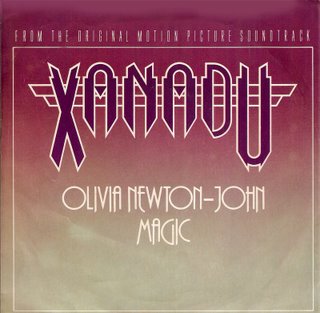
"Magic" is a song recorded by British-Australian singer Olivia Newton-John for the soundtrack to the 1980 musical fantasy film Xanadu. Written and produced by John Farrar, the song was released as the lead single from the album in May 1980 and topped the US Billboard Hot 100 for four weeks beginning on August 2. On August 30, it was displaced from the top by Christopher Cross's "Sailing".
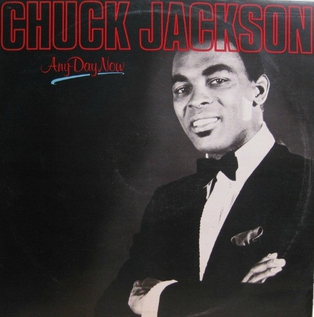
"Any Day Now" is a popular song written by Burt Bacharach and Bob Hilliard in 1962. It has been recorded by numerous artists over the years, including notable versions by Chuck Jackson in 1962, Alan Price in 1965, Elvis Presley in 1969, Scott Walker in 1973 and Ronnie Milsap in 1982. In the lyrics, the singer predicts the imminent demise of a romantic relationship and describes the sadness this will leave.
"What About Me?" is a 1984 song written by Kenny Rogers, producer David Foster, and singer-songwriter Richard Marx, and recorded by Rogers, Kim Carnes, and James Ingram as a trio song from Rogers' 1984 album of the same name. It was the lead single from the album and reached at number 15 on the US Billboard Hot 100 chart and at number one on the US Adult Contemporary chart, Marx's first number one hit as a songwriter.

"Please Mr. Please" is a song written by Bruce Welch and John Rostill, both members of British pop singer Cliff Richard's backing band, The Shadows. Welch had originally recorded the song himself in 1974 with no commercial success.

"If You Love Me (Let Me Know)" is a song written by John Rostill that was a 1974 hit single for Olivia Newton-John. It was her second release to hit the top 10 in the United States, reaching number 5 on the pop chart and number 2 on the Easy Listening chart. It also reached number 2 on the Billboard country chart. As with her single "Let Me Be There", Mike Sammes sings a bass harmony. It was nominated for the 1974 Country Music Association Award for Single of the Year.

"Then You Can Tell Me Goodbye" is a song written by John D. Loudermilk. It was first released in 1962 by Don Cherry, as a country song and again as a doo-wop in 1967 by the group The Casinos on its album of the same name, and was a number 6 pop hit that year. The song has since been covered by Eddy Arnold, whose version was a number 1 country hit in 1968, and by Neal McCoy, whose version became a Top 5 country hit in 1996.
"Suddenly" is a duet performed by Olivia Newton-John and Cliff Richard from the soundtrack Xanadu, and is the love theme from the 1980 film of the same name. It was written and produced by John Farrar.

"Hurt" is a 1954 song by Jimmie Crane and Al Jacobs. "Hurt" was originally performed by Roy Hamilton, whose version peaked at number eight on the R&B Best Seller chart and spent a total of seven weeks on the chart. A version by Ricky Denell also received considerable radio airplay in 1954 on pop radio stations. The song is considered to be the signature hit of Timi Yuro, whose version went to number four on the Billboard pop chart in 1961. Elvis Presley’s 1976 version reached the top 40 on the Billboard Hot 100 and the top 10 on Billboard’s Hot Country Singles chart. Juice Newton's 1985 version scored number one on Billboard's Country chart.

"Something Better to Do" is a song written by John Farrar and recorded by Olivia Newton-John. The song was released in September 1975 as the lead single from Newton-John's sixth studio album, Clearly Love. The narrator of the song muses that she's having a hard time adjusting to life without her departed lover; even the birds are wasting their songs singing to her, and until her beloved returns, "the birds will have to find something better to do."
"Come On Over" is a ballad written by Barry and Robin Gibb and recorded by the Bee Gees for their album Main Course, with lead vocals by Robin, joined by Barry in the chorus.. A live version was recorded in Los Angeles during their Children of the World Tour and appeared on their first live album Here at Last...Bee Gees...Live. The song was more reminiscent of their older style as compared to the new R&B sound of "Jive Talkin'" and "Nights on Broadway". It would become a No.1 adult contemporary hit for Olivia Newton-John in 1976.

"Don't Stop Believin'" is the title track from the 1976 album by Olivia Newton-John. Written and composed specifically for Newton-John by John Farrar. It was released in August 1976 as the album's lead single. It peaked at number thirty-three on the Billboard Hot 100. It was her seventh number one on the Easy Listening chart, spending one week at the top of the chart in September 1976. The single also went to number fourteen on the country chart.
"Swayin' to the Music (Slow Dancin')", initially titled "Slow Dancing", is a song written by Jack Tempchin. Under the title "Slow Dancing", the song originally was a minor US hit in 1976 for the band Funky Kings (of which Tempchin was a member). The song became much better known as "Swayin' to the Music (Slow Dancin')" in a 1977 cover version by Johnny Rivers, which became a top ten US hit. It was Rivers' last Top 40 hit in the United States, and became his second Gold record.

"I Can't Help It (If I'm Still in Love with You)" is a song written and originally recorded by Hank Williams on MGM Records. It hit number two on the Billboard country singles chart in 1951. In his autobiography, George Jones printed the first six lines of the song and stated, "Its lyrics couldn't be more simple - or profound."

"Totally Hot" is a song recorded by British-Australian singer Olivia Newton-John. It was released as the third and final single from her 1978 tenth studio album of the same name, and reached number 52 on the US Billboard Hot 100 and number 92 on the Canadian RPM Top Singles chart.

"Don't Throw It All Away" is a song written by British musician Gary Benson and first released by the Shadows on their 1975 album Specs Appeal. Benson released his version as a single later the same year, which reached number 20 on the UK Singles Chart in the fall of 1975.
References
- ↑ Lewry, Peter; Goodall, Nigel (1991). Cliff Richard The Complete Recording Sessions 1958-1990. London: Blandford. pp. 108, 110, 111. ISBN 0-7137-2242-8.
- ↑ Whitburn, Joel (2004). The Billboard Book Of Top 40 Country Hits: 1944-2006, Second edition. Record Research. p. 249.
- ↑ Whitburn, Joel (2002). Top Adult Contemporary: 1961-2001. Record Research. p. 181.
- ↑ "SA Charts 1965–March 1989". Rock.co.za. Retrieved 5 September 2018.
- ↑ "Cash Box" (PDF). Worldradiohistory.com. 11 December 1976. Retrieved 22 May 2023.
- ↑ Information at Svensk mediedatabas